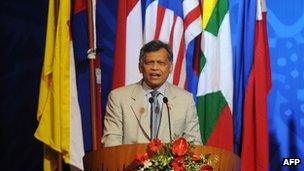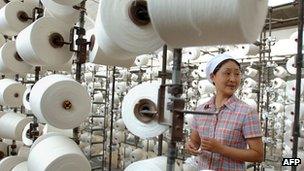China's uneasy relationship with business neighbours
- Published

Asean Secretary General Surin Pitsuwan believes the threat from China is overstated
If you are one of those people whose eyes glaze over when you hear the words China, Asean and free trade - do not worry, you are not alone. But it bears some thinking about.
The economic relationship between China and the Association of South East Asian Nations (Asean) has huge ramifications for the region, and arguably around the world.
This weekend, the Chinese city of Nanning is hosting an annual trade fair with the ten member states of Asean.
But far away in the markets and shops in Jakarta's busy commercial district is evidence of just how important the China-Asean free trade deal is for those of us living in this region.
Deal hitches?
I was out on my weekly jaunt to one of Jakarta's huge hypermarkets.
Catering to the desires of the new Indonesian middle classes, this place, like so many others in the city, has everything under one roof - from broccoli and sweet potatoes, to patio furniture and washing machines. A one-stop shop.
But look closely, and you will see that most of the products on the shelves are made in China - from children's toys, to shoes and clothes and bicycles and motorbikes.
Indonesians are buying these goods in the dozens, as are their counterparts in other South East Asian nations.
"Chinese products are so much cheaper," said one regular customer at the store.
"Maybe they don't last as long, or aren't as well made, but it's worth it for the price. You can buy three or four of these Chinese electronic guitars for kids for the price you'd pay for one made in the US."
Asean is now China's fourth-largest trading partner - behind the European Union, US and Japan.
Ever since the deal between China and Asean was implemented, trade between the two sides has climbed to almost $300bn (£188bn) - up 30% from 2009. That is a lot of electronic guitars.
But critics say the deal is not without its hitches.
"It's a bit of a mixed picture," remarked Dr Ganesh Wignaraja, the principal economist of the Asian Development Bank in Manila.
"Countries like Thailand and Malaysia are at a competitive level of production, so they've benefited from the deal. But other nations, like Indonesia and the Philippines, have not. On balance, though, Asean has done well out of the deal."
Getting it right
Right now only the six original Asean states (Brunei, Indonesia, Malaysia, the Philippines, Singapore and Thailand) have fully implemented the China-Asean Free Trade Agreement (also known as Cafta).

Opposition is growing to Chinese textiles allegedly flooding Asian markets
The other four less developed members (Cambodia, Laos, Burma and Vietnam) will begin implementing Cafta in 2015.
But already there are concerns that businesses in the big countries, such as Indonesia, are being squeezed out by China's might.
Some have accused China of flooding Asian markets with its cheap goods, and only buying raw materials from its partners in South East Asia.
Already there is vocal criticism from Indonesian parliamentarians urging the new trade minister, Gita Wirjawan, to support local industry so they can better compete with the influx of cheap Chinese goods.
There have been reports in local Indonesian media that the former trade minister, Mari Pangestu, was given a new portfolio because she did not do enough to halt the influx of trade from China.
"Asean industrialists are quietly concerned that their competitive position against companies in China is weak," said Richard Martin, managing director of the economic consultancy group IMA Asia.
"They don't back their governments on the China-Asean free trade agreement. And they aren't comfortable with what might happen in the future," he continued.
Mr Martin pointed to Thailand, which signed a bilateral free trade agreement with China a few years ago.
"Most Thais are of the view that they got the bad end of that deal. It was very one-sided," he added. "So I expect more Asean companies to try and slow down the pace at which trade is moving between Asean and China in the future.
"There will be a lot of top level political announcements that sound great, but you will find the Asean side moving very slowly on some of these things."
China threat?
But Asean leaders are quick to point out that the benefits they get from a strong economic relationship with China are far more advantageous than isolating one of the world's strongest economies, and an increasingly important world power.
The Secretary General of Asean, Surin Pitsuwan, told BBC News that in the past "trade between China and Asean has been in China's favour".
"But the difference is in a decreasing trend," he explained. "The trade deficit was $21.7 billion in 2008 and down to $4.2 billion in 2010."
Mr Pitsuwan continued that he did not think that "the general public in Asean is too worried about the potential threats of China".
"Asean chooses to look at the positive side of China. That's why we are engaging China in many areas. Asean sees China as a significant political friend," he said.
Some might say the the relationship between Asean and China is one born out of necessity.
However, if it is to be a success in the future, then it will be important that there is not a widening gap between what Asean officials might declare and how businesses in Asia feel on the ground.
- Published19 July 2011